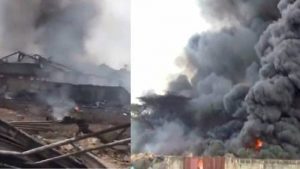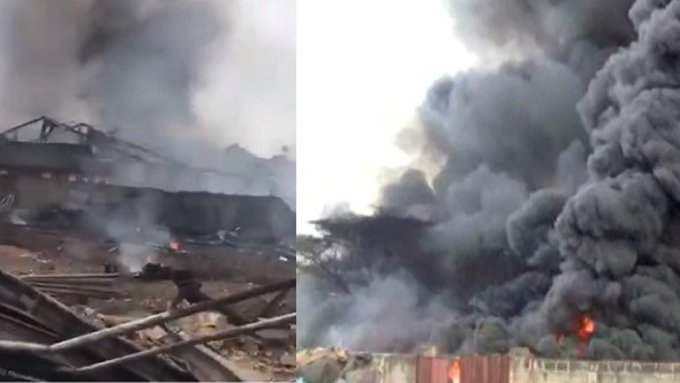
Anticipate that religious societies must have started designing vigils and weekly prayers to fight against the devil for masterminding incessant gas explosions rocking the country. But I have news for them: the devil is no longer in the winds; it has transformed into humans and now dwells in government houses and in offices of the Nigeria National Petroleum Corporation. If anyone wishes to bind and cast the devil, they now know where to go.
While the country is still gripped by a BBC forensic analysis that appears to implicate the NNPC in the Abule-Ado 2B pipeline explosion, which killed over a dozen people in March, more than two dozen Nigerians perished in tanker explosions in Lokoja and Iju-Ishaga just last Wednesday. But pipelines and tankers are not exploding for no reason.
These explosions are direct results of how irresponsible politicians heading the NNPC and their cronies in the Independent Petroleum Marketers Association of Nigeria (IPMA) have put greed before public safety. It is rather unfortunate that both organizations must yet again be lectured on how to conduct businesses without killing innocent Nigerians as if they do not know what to do.
Indeed, petroleum products must be transported across the country to meet market demands. But the transportation of these products must be largely relegated to the pipelines while tankers should be removed from inner city roads. Transporting petroleum through the pipelines is more efficient than through tankers. This especially as tankers are moving explosive devices awaiting the slightest trigger. It is unimaginable to think that a society would be comfortable seeing a tanker carrying thousands of gallons of petrol plying the same inner city roads that host hot-snack stalls and food canteens.
In higher-income countries, including the United States and most of Europe, petroleum products are almost exclusively transported through well-maintained networks of pipelines. I have lived in the United States for close to three years, and not once have I seen a tanker in the streets. How could that even be allowed when senators and minimum wage earners live on the same inner city streets, which automatically condemns both to the same fate if a tanker were to explode? However, the option of pipeline transportation would still not offer any iota of safety if the Nigerian Pipelines and Storage Company Limited, the relevant subsidiary of the NNPC in pipeline maintenance, does not thoroughly assess all networks in the country.
But the families of those that lost their lives in Ijegun, Idimu, Abule-Egba, Abule-Ado, Lokoja, and now Iju-Ishaga must all get justice. Certainly, a society that refuses to punish anyone for such a rampage of callous accidents is destined for anarchy. Accidents of this nature just don’t happen for no reason. People have to be held accountable. If the federal government can deploy resources to prevent Boko Haram from murdering innocent Nigerians, nothing must stop it from deploying the same resources to identify and prosecute the individuals responsible for the tanker and pipeline explosions.
A good way to start the pursuit of justice would be for the federal government to urgently set up a commission to investigate these explosions. This commission should not include the NNPC or IPMA but must comprise of non-Nigerian petroleum forensic investigators and members of the Nigerian civil society.
Accidents are avoidable and avoidance starts with good leadership. Nigerians must first understand that they deserve better leadership before equitable changes in reforms can happen. It is an absurdity that no level of calamity can keep politicians straight on their toes. But after the incidents in Lokoja and Iju-Ishaga, the country’s leadership must bury its head in shame.
However, the onus of making life less miserable in this country rests on the shoulders of Nigerians. The civil society must pressurize the NNPC to reassess its handling of the maintenance of pipelines. Regular Nigerians must also call on their elected representatives—perhaps through protests—to pursue reforms that would keep tankers off inner city roads and make pipelines safer.
Tankers and pipelines crisscross all major highways, and inner city roads, which means everyone’s house would always be around the corner. This is not the time for the public to sit and observe.















